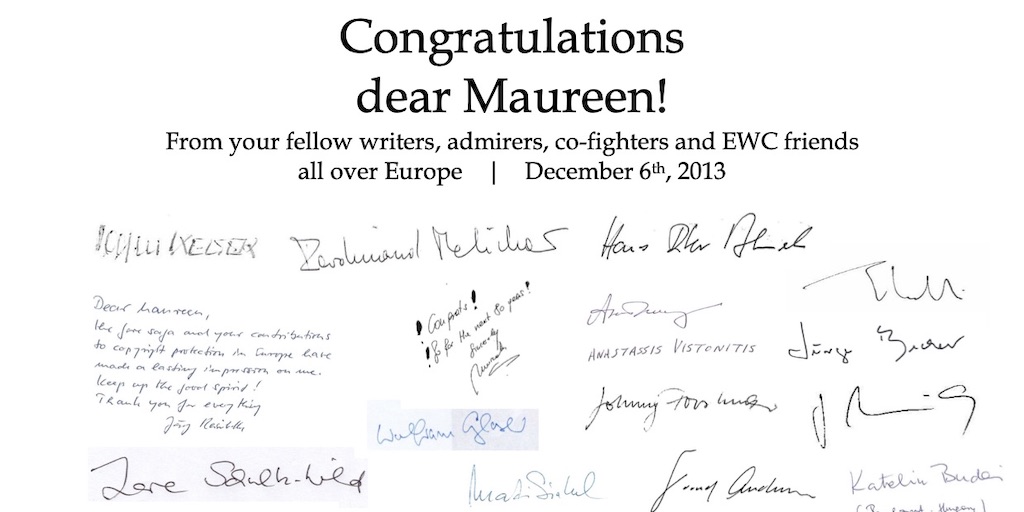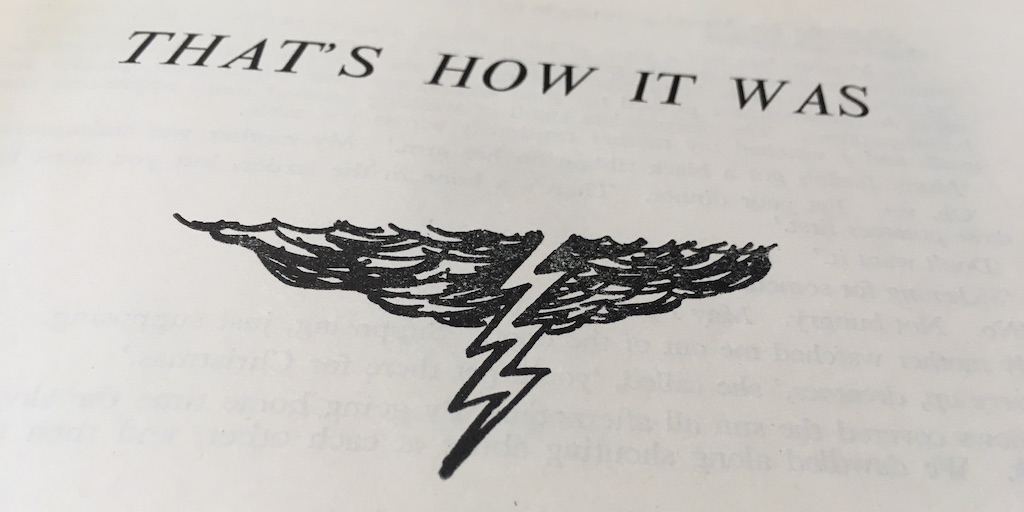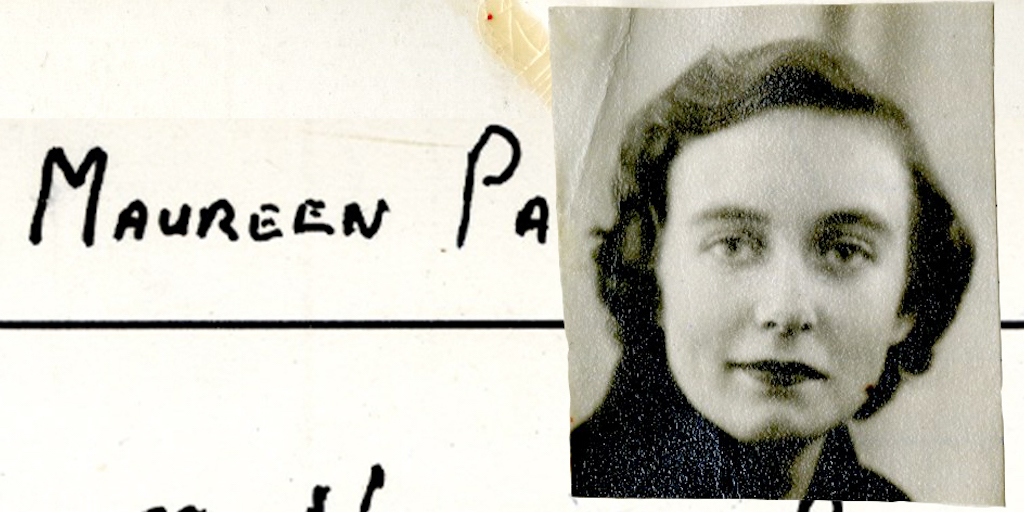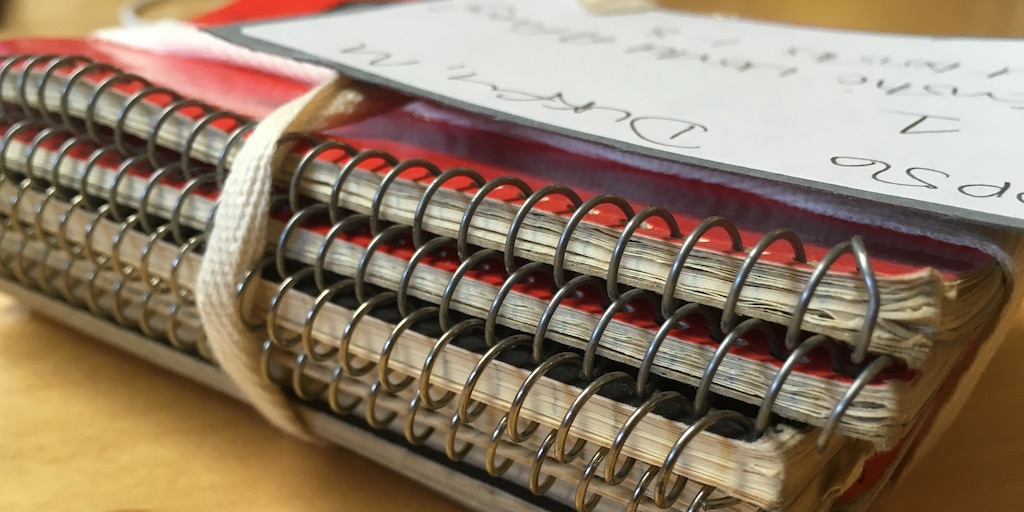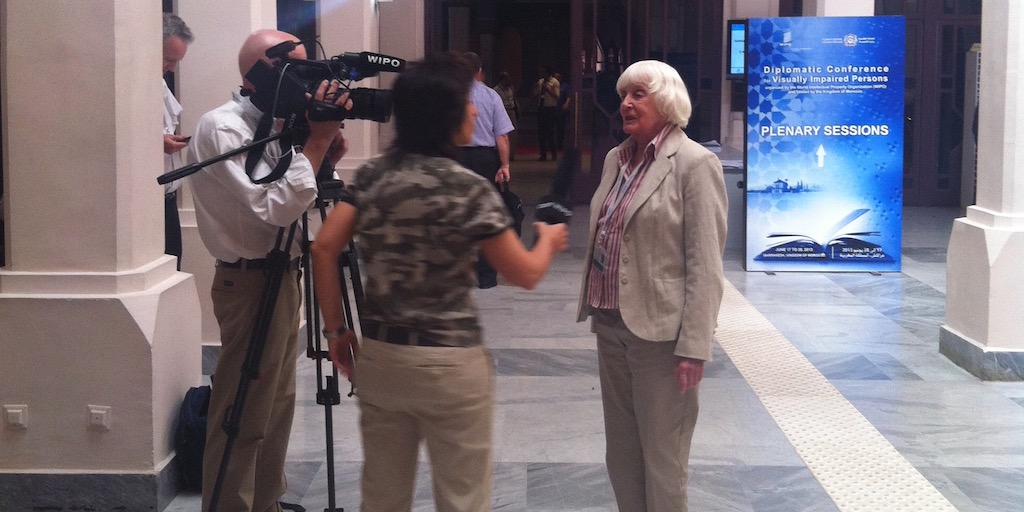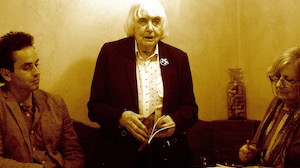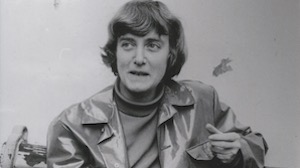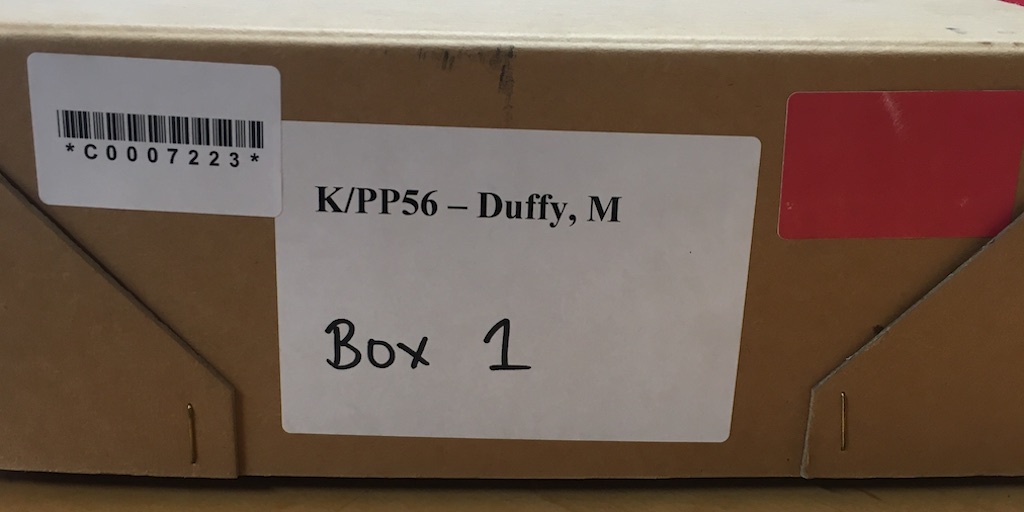Maureen Duffy at 80: In Times Like These
FIGHTING AND WRITING
Header image: Signatures and well wishes from friends and colleagues at the European Writers' Council.
Memories of the German Writers' Union
by Sabine Herholz
Maureen’s guideline, “don’t panic”, will have surely influenced her work to fight for copyright, especially droit morale (moral rights) matters, meaning the protection of the author and her or his intellectual property. For the German Writers’ Union she has been “the rock in heavy waters”, as an old German saying goes. Maureen’s judgements and following decisions for copyright problems were extremely important. We could rely on her opinions; she consequently influenced the work of the German Writers’ Union (VS) and guided us to follow a clear perspective in this jungle of meanings and opinions.
The needs of writers are very similar throughout Europe, and even the world. Although there are differences between copyright and authors’ personal rights, authors have to fight along the same lines for their rights, for better conditions in publishing their works, for fair remuneration and licensing solutions. It is very helpful to know how these topics are being handled in the various European countries, enabling authors to compare their conditions to those in other countries.
Being united through the EWC with experts and specialists in various important subjects, it is possible to exchange opinions and expertise and moreover to use this knowledge to achieve better contract conditions. This is fundamentally important as the process of writing itself is a rather lonely business.
I met Maureen for the first time in May 1991 at the Regensburg European Writers’ Congress where she was elected Vice-President. I had been elected a year before General Secretary of the German Writers’ Union and this was my first EWC meeting.
I remember that I was quite overwhelmed by their members’ professional experience, the variety of topics to discuss, the information concerning international affairs, and the vast field of writers’ needs for living and writing in their various countries and book markets.
The elected members of the board had to tackle a heavy workload laid out in the agenda. As I remember, Maureen was the one with the most energetic appearance although she did not have an air of a functionary.
Later I learned that Maureen was not only an expert in copyright matters but also a well known and famous writer. Despite the huge amount of work for the EWC and other copyright institutions, she published a large number of novels, poetry, radio- and screenplays.
She gave me her book Restitution (1998), a novel about personal and national identity, as a present.
I had great pleasure in reading this book. Her vivid and colourful language forms a picture, a tableau, she creates a family saga with her characters living in the last century. Maureen is like a painter to me. She paints with words in her beautiful language. Her characters are very clear cut and in the progress of reading they come to the reader’s eye like photos in a family album.
I was impressed by the way Maureen organized her work as EWC Vice-President and later President, her continuous battle for copyright, and for authors’ rights especially the Domaine Public Payant. [1] She announced that the use of authors’ works should be subject to appropriate remuneration even after a term of copyright protection of 70 years past mortem auctoris through a Domaine Public Payant.
I worked for the German Writers’ Union between November 1989 and May 2006. Authors’ rights were always on the Agenda of the Writers’ Union and the EWC, from beginning to end: but there is no end to make you lean back and be happy.
During a meeting concerning the multi-media exploitation of copyright unfavourable to the author because it had become clear that publishers and manufacturers wished to exploit these rights themselves, it was necessary to look for possible cooperation with publishers, booksellers and librarians.
At the meeting with librarians, represented by EBLIDA, Maureen went straight to the heart of the matter: “We are not greedy”, she said, “but they must not kill the goose that lays the golden egg, but rather help to keep us fed, so we can go on laying.”
Thanks to the continuous efforts of Maureen, the Cultural Committee of the European Parliament decided in 1997 and the following years to include an EWC grant in its budget. This was a big step and high time because the resources of the EWC were rather limited. The representatives of the EWC board were working on a voluntary basis, thus without payment. The General Secretary was paid in order to maintain the important and necessary office work to keep the EWC going, with its significance for the international communities of writers and translators throughout Europe.
But Maureen’s efforts were not only concentrated on budgeting.
She is known and acknowledged for her persistent battle - as I said before - for copyright protection and equitable remuneration, for licensing agreements enabling the author to rely on royalties from ‘secondary’ exploitation for example, from translations, radio- and screenplays, rather than simply on initial sales of their books. More recently, better protection against online piracy and theft of intellectual property on the internet has been on the EWC’s Agenda.
The 16th European Writers’ Congress was held in Stockholm at the end of August in 1998, when Maureen was re-elected Vice-President. Parallel to the Congress, a public forum on “The Situation of the Book in Europe” was organized, sponsored by Swedish and Nordic organisations.
Meanwhile, copyright violations in several countries were considered a threat to authors’ rights. For this reason, a submission was drafted by Maureen, and consequently the EWC decided to lodge an appeal addressed to national governments and members of the European Parliament.
For me the Stockholm Congress was particularly important as I had the chance to talk to Maureen privately. A year prior, I had lost my beloved partner in an accident. I did not feel particularly well and was on the brink of resigning from the position of General Secretary of the German Writers’ Union. I was full of doubts about whether I could carry on with business as usual. Listening carefully and asking a few questions, Maureen told me how important my position was and how much I was needed handling those difficult tasks in the Writers’ Union. Maureen encouraged me and supported me wholeheartedly, thus enabling me to go back to work self assured and with fresh energy.
Quite some time has passed since then, but I shall never forget this late August afternoon in Hässelby Manor House in Stockholm and Maureen’s support and advice helping me to get on with life.
References
[1] Paying public domain (French: Domaine public payant, Spanish: dominio público pagante) is a copyright regime where copies, presentations or performances of a work that has entered the public domain are still subject to royalties, which are payable to the state or to an authors' association. The principle is that revenue from the work of long-dead artists should be used to support the creativity of living artists. (https://en.wikipedia.org/wiki/Paying_public_domain)
Appendix: Fall of the Wall
The Wall separating Germany into East and West for 28 years was opened on 9th November 1989, a few days before I took up the position of General Secretary of the German Writers’ Union. A day I shall never forget. A miracle had happened: during the past years any hope had been given up that the Wall would come down and the country be united.
This ‘wall of terror’ erected in August 1961, separating East and West Germany, had destroyed families, friends and relationships. People in East Germany were forced into living an entirely different life, separated by the so-called “iron curtain”, marked by severe shortages of all kinds of goods, without the freedom of speech and writing, the possibility to travel wherever one wanted and being controlled and spied upon. The Wall was to stop people from fleeing to the West, and a number of people were killed trying to do so. Before the Wall was erected in August 1961, two million people fled the country, among them many well known writers and artists, scientists and well-educated young people.
The Regime of the German Democratic Republic, the GDR or DDR, was set up as a copy of the Soviet Union Regime with its ruthlessness in treating people who did not fit into the frame of the communist party discipline.
But times were changing and when Gorbachev came into power, change could take place. With his introduction of Glasnost and Perestroika, he started a political reform process enabling people in Eastern Germany to develop hope and resistance.
With the support of the church an opposition movement came into action, accompanied by big demonstrations in many towns of East Germany.
In the end the people in East Germany succeeded in their revolution and with their slogan “We are the people”, forced the regime to resign and the Wall to be opened. No weapons were used, no tanks, no military police, no shooting, although they were surrounded by big numbers of German and Russian military forces who had orders not to interfere. It was a peaceful revolution.
The unification started with a big fête and fireworks on New Year’s Eve 1989/1990 at the Brandenburger Gate. These joyful pictures were to be seen on the media around the world.
I too was overwhelmed by the new situation and had difficulty in accepting this as happening in real life and not as a fantasy. I somehow could not believe this was true. As a teenager I was witness to the Wall being built in Berlin and afterwards had to suffer and deal with all the trouble arising from this catastrophe. It took me quite some time to realize the Wall was open and would soon disappear altogether.
At Christmas 1989 we had a happy family reunion in Berlin, overshadowed by the loss of some family members who had died during those years of separation.
The formal unification took place on 3rd October, now a National holiday. By then people from East and West had to get to know each others’ way of living, which was not easy for Easterners because powerful Westerners with all their technical advantages and knowledge of modern ways of life dominated in lifestyle, wealth and political beliefs. People from the East had the feeling of having lost or going to lose their identity and of being outvoted. Some writers were confronted with the fact their literature was mostly not wanted, especially the works with a certain political background, sponsored by former party organisations.
For many years the German Writers’ Union was organizing numerous seminars, meetings, lectures, conferences and congresses to prepare and support writers and translators for the new capitalist market rules. Before, works may not have been published because the publisher’s censor denied publication. Now, manuscripts were not published because publishers were not interested in their stories.Nowadays it is even more difficult for the majority. Due to globalisation a huge international market has developed and competition has become even harder.
It was also very difficult for writers to live up to new standards of writing and publishing. Now, after 25 years have gone by, a new generation has grown up and the differences between East and West have diminished, at least in the younger generation of writers and translators. They now have to cope with new problems of writing and publishing, i.e. the new media, licensing of secondary rights, and copyright in the digital world.
Alas, the show must go on: books printed on paper are still on the market and will hopefully be so for many years to come.
November 9th 2013
Sabine Herholz
Sections and Chapters
Duffy and King's introduction
Katie Webb
Finding Maureen Duffy in the Archives
Patricia Methven
King's in Maureen Duffy's time
Christine Kenyon Jones
Kings, and Queens, Histories in Fact and Fiction
Clare A. Lees
Panel Summary: the city as a space for new possibilities
Phoebe Blatton
Writing, Rites, and Rights
John Stokes
A Window for Maureen Duffy
Clare Brant
Fighting and Writing introduction
Katie Webb
Duffy and the European Writers' Congress
Lore Schultz-Wild
An 80th Birthday Honorific Speech
Ingrid Protze
Memories of the German Writers' Union
Sabine Herholz
On Maureen
Katalin Budai
A copyright warrior and a true defender of rights
Olav Stokkmo
Recognising writers: responses, records, royalties
Katie Webb
Maureen Duffy's contribution to gay rights and lesbian visibility
Jill Gardiner
For Maureen Duffy, Poiêtes
Karen Gevirtz
Editor's introduction
Katie Webb
Maureen Duffy: Scrivener and Prophet
Charles Lock
Words that count: Maureen Duffy
Marina Warner
Browse articles on Fighting and Writing
